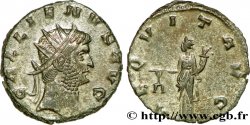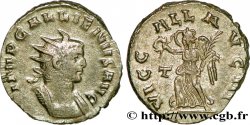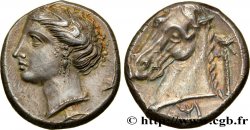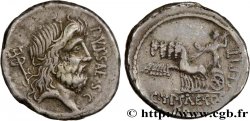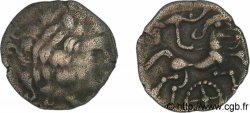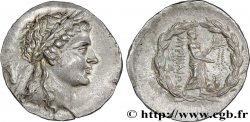- Accueil
- >
- >
v08_0413 - GALLIENUS 8 assaria, (GB, Æ 34)
MONNAIES 8 (2000)
Starting price : 144.83 €
Estimate : 228.67 €
Realised price : 157.02 €
Starting price : 144.83 €
Estimate : 228.67 €
Realised price : 157.02 €
Type : 8 assaria, (GB, Æ 34)
Date: c. 255-260
Mint name / Town : Tarse, Cilicie
Metal : copper
Diameter : 34 mm
Orientation dies : 6 h.
Weight : 22,80 g.
Rarity : R2
Coments on the condition:
Bel exemplaire pour ce type de monnayage / Frappe un peu molle au revers
Catalogue references :
Obverse
Obverse description : Buste radié, drapé et cuirassé de Gallien à droite vu de trois quarts en avant (A).
Obverse legend : AU KAI P H-G - GALLIHNOS SEB/ P|P
Obverse translation : (L'empereur césar Publius Egnatius Gallien auguste, père de la patrie).
Reverse
Reverse description : Niké ou Victoria (la Victoire) debout à droite, nue jusqu'à la ceinture, les ailes déployées, le pied gauche posé sur un globe et soutenant un bouclier sur lequel elle grave la légende.
Reverse legend : TARSOU MHTROPOLEWS AMK/ G|G// EIS/ AINA/TOUS/ KURI/OUS
Reverse translation : (Ville de Tarse, trois fois décorée/ sur le bouclier en cinq lignes : espérant l'Éternité de nos empereurs).
Commentary
Mêmes coins que les exemplaires de la collection Aulock et Levante. Poids lourd.
Same corners as the Aulock and Levante collection examples. Heavyweight
Same corners as the Aulock and Levante collection examples. Heavyweight








 Report a mistake
Report a mistake Print the page
Print the page Share my selection
Share my selection Ask a question
Ask a question Consign / sell
Consign / sell
 Full data
Full data